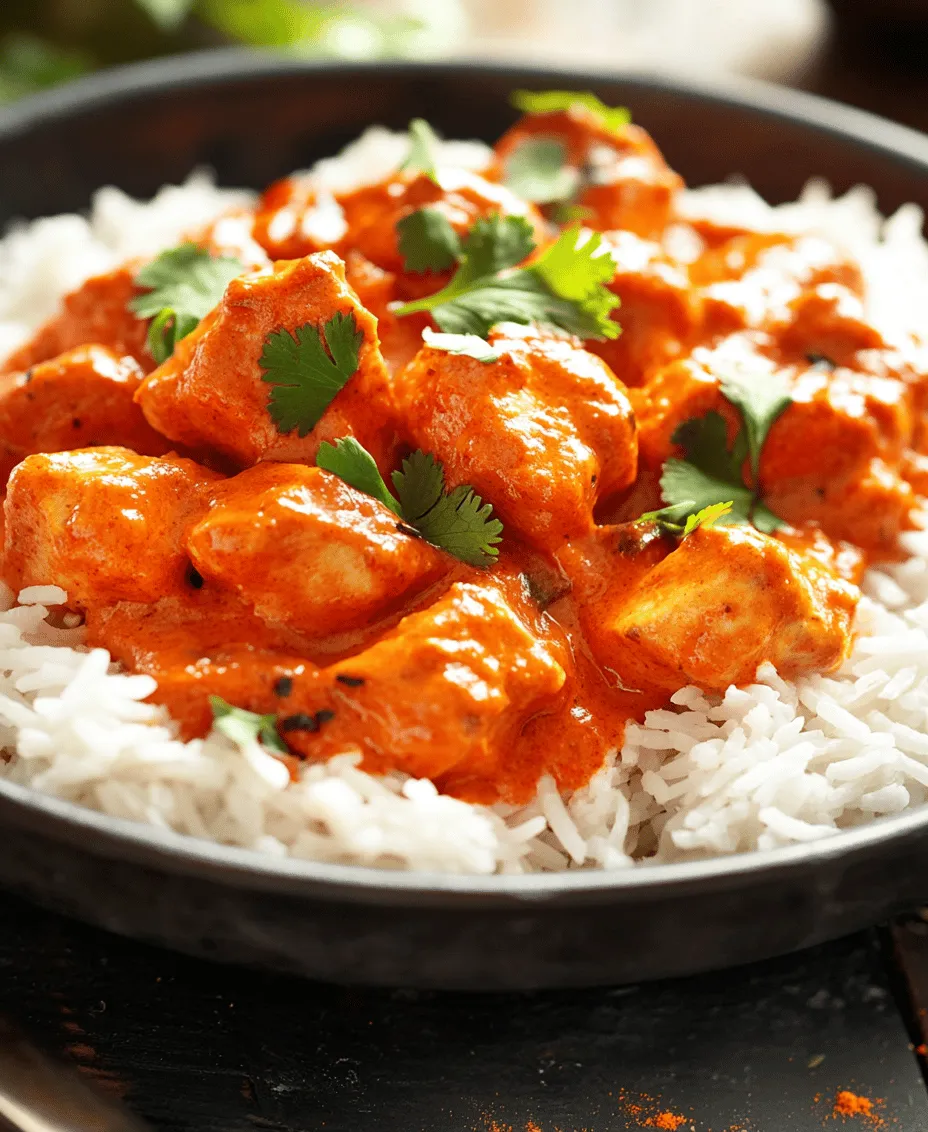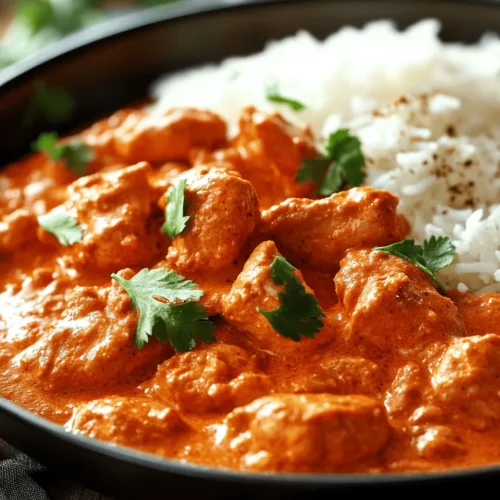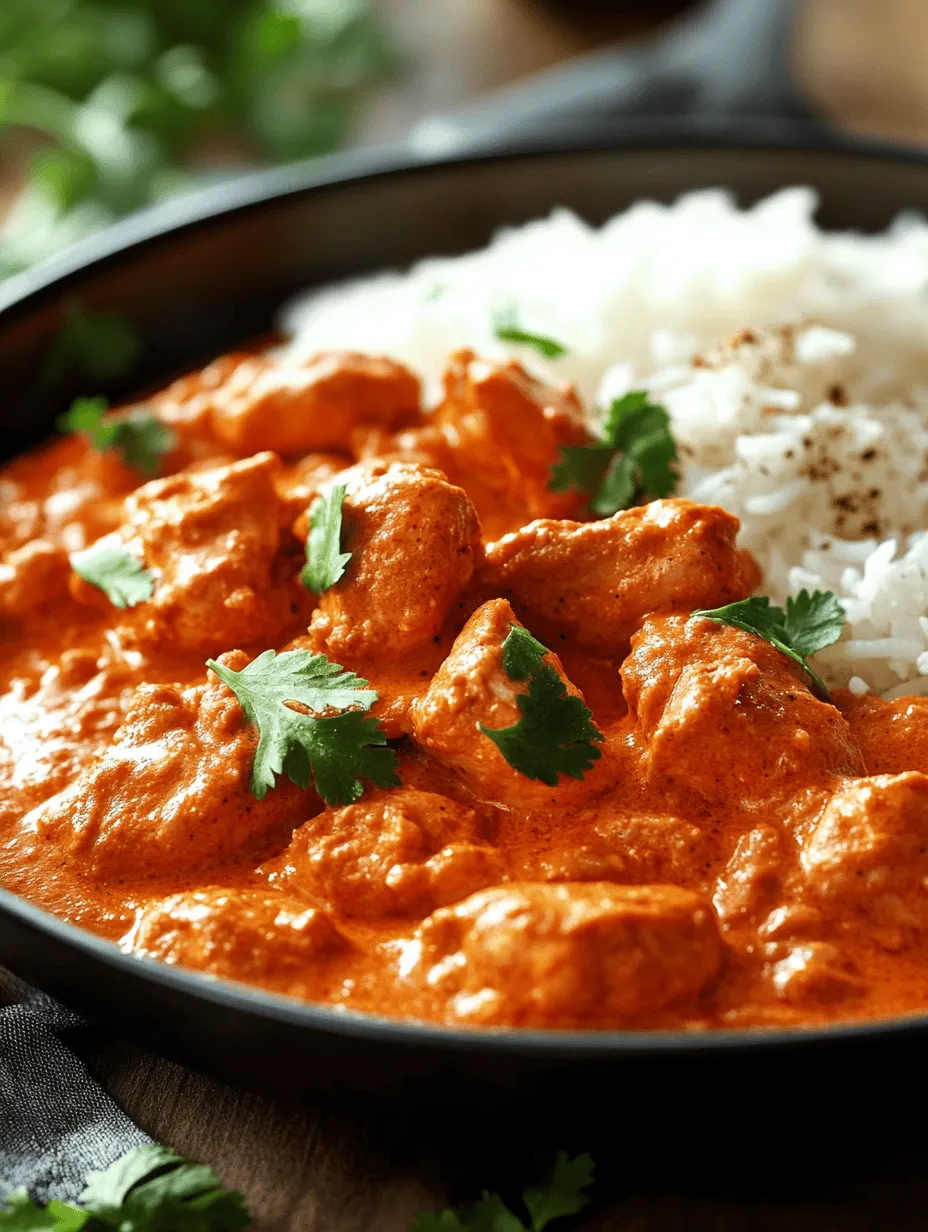Introduction to Gordon Ramsay’s Chicken Tikka Masala
In the realm of culinary delights, few dishes can rival the rich, aromatic appeal of Chicken Tikka Masala. Renowned chef Gordon Ramsay has elevated this beloved classic to new heights, presenting a recipe that artfully combines tender chicken, an array of vibrant spices, and a creamy, tantalizing sauce. This dish is not just a meal; it is a celebration of flavor that transcends borders, bringing together the best of Indian culinary traditions with a global twist.
Chicken Tikka Masala has earned its place in the hearts of food lovers around the world, and for good reason. The marriage of marinated chicken, grilled to perfection, and a luscious sauce creates a symphony of tastes that is both comforting and exhilarating. Whether served with fluffy basmati rice, warm naan, or a fresh salad, this dish promises to delight the senses and transport diners to the bustling streets of India.
In this blog post, we will explore the fascinating origins of Chicken Tikka Masala, dissect the key ingredients that contribute to its unique flavor profile, and provide you with a comprehensive, step-by-step guide to preparing this delectable dish in your own kitchen. Whether you’re an experienced home cook or a culinary novice, this recipe is designed to infuse warmth and vibrant flavor into your dining experience.
The Origins of Chicken Tikka Masala
Understanding the Cultural Significance
Chicken Tikka Masala is a dish steeped in rich history and cultural significance. Its story is as complex as its flavor, and it is often debated whether its origins lie in India or the United Kingdom. While some assert that the dish emerged from Indian kitchens, others argue that it was created by South Asian immigrants in the UK, adapting traditional recipes to suit local tastes. This debate highlights the dish’s ability to evolve and adapt, much like the cultures it has influenced.
Historically, chicken tikka refers to marinated pieces of chicken that are grilled or roasted. In India, this dish is often served as a starter, accompanied by mint chutney and sliced onions. The transition to a sauce-based dish, particularly in the UK, marks a significant turning point in its evolution. The introduction of a creamy tomato sauce, enriched with spices, transformed chicken tikka into the Chicken Tikka Masala we know and love today.
The dish has gained unparalleled popularity across the globe and is often considered a symbol of Indian cuisine. It has become a staple in Indian restaurants, and its vibrant flavors have captivated the palates of countless diners. In fact, in 2001, the UK government even declared Chicken Tikka Masala a national dish, further solidifying its status as a beloved favorite.
Ingredients Breakdown: The Heart of the Dish
Key Components of the Recipe
To truly appreciate the magic of Gordon Ramsay’s Chicken Tikka Masala, it’s essential to understand the key ingredients that bring this dish to life. Each element plays a critical role in creating the rich, layered flavors that characterize this culinary classic.
1. Chicken: The star of the dish, boneless and skinless chicken thighs are the preferred choice for their tenderness and ability to absorb flavors. While chicken breast can be used, thighs offer a juicier, more succulent result.
2. Yogurt: A key ingredient in the marinade, yogurt not only tenderizes the chicken but also adds a creamy texture and tangy flavor to the dish. The lactic acid in yogurt helps break down the proteins in the meat, resulting in a more flavorful and tender end product.
3. Lemon Juice: This ingredient adds brightness and acidity to the marinade, enhancing the overall flavor profile. The citrus notes help balance the richness of the cream and spices in the final dish.
4. Spices: The heart of Chicken Tikka Masala lies in its spices. A blend of garam masala, cumin, paprika, and turmeric creates the distinctive flavor that makes this dish so memorable. Each spice serves a specific purpose, contributing to the overall depth and complexity of the sauce.
The Importance of Marination
Marination is a crucial step in the preparation of Chicken Tikka Masala. It allows the chicken to absorb the flavors of the yogurt and spices, resulting in a dish that is both flavorful and aromatic. The ideal marination time is at least one hour, but for optimal results, marinating overnight is highly recommended. This extended time allows the flavors to penetrate deeply into the meat, ensuring a deliciously tender and flavorful chicken.
Choosing the Right Chicken
When it comes to selecting the right chicken for your Chicken Tikka Masala, boneless, skinless chicken thighs are the best option. Their higher fat content compared to chicken breasts contributes to a juicier, more flavorful dish. However, if you prefer using chicken breasts, consider brining them beforehand to help retain moisture during cooking.
Spices and Their Role
The spices used in Chicken Tikka Masala are not just there for flavor; they also provide numerous health benefits. Here’s a closer look at the key spices you’ll need:
1. Garam Masala: This warm spice blend is the backbone of Chicken Tikka Masala. Typically made from a combination of cinnamon, cardamom, cloves, and other spices, garam masala adds depth and warmth to the dish.
2. Cumin: This earthy spice enhances the overall flavor profile and adds a subtle nutty aroma. Cumin is also known for its digestive properties, making it a beneficial addition to your meal.
3. Paprika: Offering a mild sweetness and vibrant color, paprika also enhances the dish’s visual appeal. It’s an essential ingredient that balances the heat from other spices.
4. Turmeric: Known for its bright yellow color, turmeric adds a warm, earthy flavor to the dish. It is also praised for its anti-inflammatory properties and health benefits.
By using a combination of these spices, you can create a dish that is not only delicious but also packed with nutritional benefits.
Step-by-Step Guide to Making Chicken Tikka Masala
Marinating the Chicken: A Crucial Step
The first step in creating Gordon Ramsay’s Chicken Tikka Masala is marinating the chicken. This process is essential for infusing the meat with flavor and ensuring it remains tender during cooking. Here’s a detailed guide on how to prepare the marinade and the chicken:
1. Prepare the Marinade: In a large mixing bowl, combine the yogurt, lemon juice, garam masala, cumin, paprika, turmeric, salt, and a touch of cayenne pepper if you prefer a bit of heat. Mix well until all the ingredients are thoroughly combined.
2. Marinate the Chicken: Cut the chicken thighs into bite-sized pieces and add them to the marinade. Ensure that each piece is evenly coated, as this will maximize flavor absorption. Cover the bowl with plastic wrap or transfer the mixture to a large resealable plastic bag to marinate.
3. Let It Rest: Allow the chicken to marinate for at least one hour at room temperature, or ideally, refrigerate it overnight. The longer the chicken marinates, the more pronounced the flavors will be.
As you embark on this culinary adventure, remember that the key to a successful Chicken Tikka Masala lies in the marination process and the careful selection of ingredients. This dish is not just about following a recipe; it’s about understanding the cultural significance, appreciating the flavors, and enjoying the cooking experience.
In the next section of our article, we will delve deeper into the cooking process, outlining the steps to prepare the sauce and bringing this vibrant dish to life. Prepare to delight your senses as we continue on this flavorful journey with Gordon Ramsay’s Chicken Tikka Masala.

Ideal Marination Time for Best Results
For the perfect Chicken Tikka Masala, marination is crucial. Ideally, you should let the chicken marinate for at least 2 to 4 hours, but if time allows, marinating overnight in the refrigerator will yield even better results. This extended marination time enables the spices to penetrate the chicken deeply, enhancing the flavor and tenderness.
Cooking the Chicken: Techniques and Tips
Proper Methods for Browning Chicken
Browning the chicken is an essential step in achieving that rich, smoky flavor characteristic of Chicken Tikka Masala. Start by heating a few tablespoons of oil in a large skillet over medium-high heat. When the oil is hot, add the marinated chicken pieces in batches. Avoid overcrowding the pan; this ensures that the chicken sears rather than steams. Cook the chicken for about 4-5 minutes on each side or until golden brown and cooked through. The aim is to develop a nice crust, which adds depth to the final dish.
Importance of Removing Excess Marinade
Before placing the marinated chicken in the skillet, it’s essential to shake off any excess marinade. This prevents the chicken from steaming and helps achieve that desirable sear. Excess marinade can lead to a watery sauce later on, which you want to avoid. A good rule of thumb is to let the chicken rest in a colander for a few minutes after marinating to drain any surplus liquid.
Creating the Sauce: Building Layers of Flavor
Sautéing Onions to Perfection
The foundation of a great Chicken Tikka Masala sauce lies in perfectly sautéed onions. Begin by adding a tablespoon of oil or ghee to the same skillet used for the chicken. Once the oil is hot, add finely chopped onions and sauté them over medium heat. Stir frequently, allowing the onions to caramelize slowly and develop a beautiful golden color—this should take about 8-10 minutes. The sweetness from the caramelized onions will enhance the sauce’s overall flavor profile.
The Role of Canned Tomatoes in the Sauce
Next, add canned tomatoes to the sautéed onions. Opt for quality whole or diced tomatoes, as they provide the necessary acidity and depth of flavor. Crush the tomatoes with a wooden spoon as they cook, allowing them to blend seamlessly with the onions. The cooking process should simmer for about 10 minutes, allowing the flavors to meld together beautifully.
Incorporating Coconut Milk for Creaminess
To achieve that signature creaminess in Chicken Tikka Masala, add a can of coconut milk. This ingredient not only enriches the sauce but also balances the spices, giving the dish a luscious texture. Stir the coconut milk into the tomato-onion mixture and allow it to simmer for an additional 5-7 minutes. This step is crucial; it helps the sauce thicken and intensifies the flavors.
Bringing It All Together
Combining Chicken and Sauce for Optimal Flavor
Once the sauce has thickened and reached your desired consistency, it’s time to add the browned chicken back into the skillet. Stir well to coat all the pieces with the sauce, allowing them to bask in the flavors. Simmer everything together for another 5-10 minutes to ensure the chicken absorbs the aromatic spices and warms through.
Adjusting Seasoning and Sauce Thickness
Before serving, taste the sauce and adjust the seasoning as necessary. You may want to add salt, pepper, or a pinch of sugar to balance the acidity from the tomatoes. If the sauce is too thick, you can add a splash of water or chicken broth to reach your preferred consistency. Conversely, if it is too thin, let it simmer uncovered for a few minutes to reduce.
Serving Suggestions: Elevating the Experience
Pairing with Accompaniments
Chicken Tikka Masala is traditionally served with either basmati rice or naan bread. Basmati rice is light and fluffy, providing a perfect canvas to soak up the flavorful sauce. On the other hand, naan, particularly when freshly baked, offers a delightful texture and can be used to scoop up the chicken and sauce, adding to the eating experience.
Ideas for Garnishing to Enhance Presentation
To elevate the presentation of your Chicken Tikka Masala, consider garnishing with fresh cilantro or parsley. A drizzle of cream or yogurt on top can add a touch of elegance, while lime wedges on the side allow diners to add a refreshing citrus burst. You can also sprinkle some toasted almonds or cashews for an added crunch.
Nutritional Information: Understanding the Dish’s Value
Caloric Content and Macronutrient Breakdown
When preparing Chicken Tikka Masala, it’s essential to be mindful of the nutritional aspects. A standard serving (about 1 cup) of Chicken Tikka Masala can range from 350-500 calories, depending on the specific ingredients and portion sizes. The dish typically contains around 25g of protein, 15-20g of fat, and 30g of carbohydrates. The use of coconut milk adds healthy fats, while the chicken provides lean protein.
Health Benefits of the Ingredients Used
The spices used in Chicken Tikka Masala, such as turmeric, cumin, and coriander, offer various health benefits. Turmeric, for instance, is known for its anti-inflammatory properties, while cumin can aid digestion. Incorporating tomatoes adds antioxidant-rich lycopene, and the inclusion of coconut milk provides essential vitamins and minerals. By using fresh ingredients and controlling the amount of oil and cream, you can create a dish that is both delicious and nutritious.
Conclusion: Relishing the Flavors of Home-Cooked Chicken Tikka Masala
Gordon Ramsay’s Chicken Tikka Masala is not just a dish; it is an experience that brings together culture, flavor, and the joy of cooking. By following this detailed guide, you can create a meal that not only satisfies your hunger but also enriches your culinary skills. Embrace the aromatic spices and creamy textures of this classic recipe, and enjoy a comforting dish that is sure to impress family and friends. Celebrate the art of cooking with this delightful recipe, and relish the flavors that fill your home with warmth and love.



